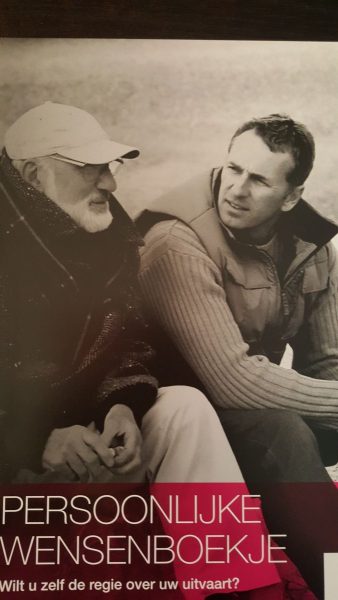There are many wonderful things about being an expat and we often write about those things in these articles. Sometimes however, sad things happen. Someone close to you dies or you are invited to a funeral of someone maybe not so close, but you don’t know the right protocol. This article is intended to give you an idea of what to do in those circumstances. A time of grief is particularly hard when you are away from family and friends and it can be hard to focus and plan.
If someone in your immediate family here dies and you need to organise what happens
Once death has been established, you call an uitvaartondernemer (funeral consultant, like an undertaker or funeral director). This can be an independent individual, or you can call one of the many companies that specialize in this area, who will send the nearest available consultant to see you as soon as possible. (Note: if the deceased is insured with a particular company, you must call that company.) These consultants are available 24 hrs/day, but you may wish to wait till the next morning, for example, before phoning.
The consultant will come to your house and discuss your budget and wishes. (More about this in a bit.)
They will also do the administration for you. For example: they notify the gemeente (city hall, municipality) (who automatically inform the tax office, the health insurance and the pension fund institutions) and then forward you the overlijdensakte (death certificate) when ready; they can organize death notifications to be sent out (these are called rouwkaarten (literally mourning cards in Dutch), or place an obituary in the newspapers should you wish. They also organize where the body of your loved one goes whilst you await the funeral or cremation and if you want a priest/vicar/rabbi/imam but don’t know one personally, that can be arranged too.
Note 1: You will need to inform other institutions such as banks yourself and for that you generally require the death certificate.
Note 2: You are allowed to skip hiring an uitvaartondernemer, but doing it alone is quite arduous.

Where does your loved one stay?
In the Netherlands, the deceased must be buried/cremated within 6 working days after the date of death. It is possible to ask for an extension and this is usually granted for pressing matters such as allowing loved ones from abroad to be able to attend for example.
Where you wish your loved one to be during those 6 days is up to you. You may wish to keep them at home or have them taken to an uitvaartcentrum (funeral home) where you may choose an open casket and a viewing room (completely private with you having the only key, or semi-public) or a closed casket with no visitors allowed for example. Embalming is illegal in the Netherlands, but thanatopraxia (a light embalming-like procedure to preserve the body for a short time) is possible if desired.
Note: people who reach their end of life in a hospital are usually transferred to the hospital morgue as a standard, but you are free to arrange for them to be moved somewhere more appropriate to you if you wish.
How do you notify the deceased’s relations?
Due to the 6-day rule, this is a priority. In the Netherlands so-called rouwkaarten are sent out. You are completely free how to compose these (e.g. whether you include poetry, quotes, photographs for example), but these will typically contain name, birth and death dates, date and time of funeral and a contact address. People receiving a rouwkaart will generally view it as notification, but also as in invitation to the funeral. If you do not wish people attending you mention that the funeral has been held/will be held in besloten kring (literally: within a closed circle).
An alternative is to place a notification/obituary in a newspaper.
Rouwkaarten are treated as a priority by the postal service and are delivered separately. They guarantee next day delivery in the Netherlands.
You may wish to inform friends and family abroad by e-mail, attaching the rouwkaart as a PDF for example.
The funeral consultant will help with all of these things.
Funeral
 If you opt for a cremation this is generally less expensive. Cremations are held at a crematorium, where you book a time slot. You can choose a more intimate family room or a larger room with more formal seating. You are free to celebrate your loved one’s life as you see fit. At the end, the coffin is either taken away or you may say your goodbyes and leave the room.
If you opt for a cremation this is generally less expensive. Cremations are held at a crematorium, where you book a time slot. You can choose a more intimate family room or a larger room with more formal seating. You are free to celebrate your loved one’s life as you see fit. At the end, the coffin is either taken away or you may say your goodbyes and leave the room.
You are also able to be present at the cremation process itself, but you must make a separate appointment for this.
Ashes can be collected between 1 month and 1 year after cremation. You can then choose to take the ashes home, have them scattered in a special area at the crematorium, buried in an existing grave or stored in a columbarium.
You may prefer a burial. This involves more administration and costs (hiring/buying a plot, purchasing a head stone, ongoing maintenance) and you will need to have coffin bearers (4-6). If you are not able to provide them, you can ask the funeral consultant to arrange them for you.
Note 1: Any religious services are usually held in a place of worship and guests and relatives then travel to the crematorium or burial site.
Note 2: The coffin must be biodegradable and all metal pieces are removed before actual burial.
Note 3: Instead of a church yard, you are also able to choose to be buried in a so-called nature burial site. You buy a location and graves are typically marked with carved tree stumps or marked boulders.
Note 4: If your loved one wished to be returned to their home country for example, you can ask the funeral consultant to organize that for you.
Note 5: Many locations now offer live-stream options for friends and relatives abroad to be able to follow any memorial services if you should wish.
Afterwards
In all cases, you may wish to provide refreshments for the attendees. This is often possible at the crematorium or burial site, or nearby restaurants will often cater for this need and of course you can always choose to do this at home. It used to be tradition to serve coffee and a slice of plain cake. These days the options are endless.
Attending a funeral
If you receive a rouwkaart which does not include the phrase in besloten kring, you are invited. If you are not going to attend, it is considered polite to let the relatives know.
With an obituary in the newspaper or on social media, unless stated otherwise, you are invited.
In all cases, it is considered polite and it is often very welcome if you send a card or letter of condolence. Flowers are also fine unless there is mention of geen bloemen or liever geen bloemen.
If you wonder about what to wear to the funeral service, if nothing is mentioned in the rouwkaart, use what you know of the deceased and their family and adapt accordingly. Unless there are particular religious prescriptions, there are no set rules.
Before entering the room, you will often be asked to sign a register with your name and address and sometimes there is room for a personal message also.
This allows the relatives to send a thank you (usually around 6 weeks after the funeral). These are often pre-printed cards, thanking you for your condolences. At Catholic funerals you may also receive a devotional or prayer card either at the funeral or afterwards.
In putting this article together, I am greatly indebted to Ellen de Vries- van den Bergh, a funeral consultant with Algemeen Belang Uitvaartverzorging. Her two most important tips:
- Discuss your and their wishes with your family. It is very helpful for all concerned when the time comes.
- If someone you know dies, always let the relatives know how sorry you are (even a short note, visit or telephone call is fine) and let them share their stories with you.
Alexandra van den Doel
 +31 (0)50 367 71 97
+31 (0)50 367 71 97  info@connect-int.org
info@connect-int.org